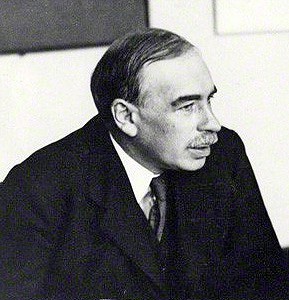John Maynard Keynes on Eugenics, Race, and Population Control
Edward W. Fuller, Ludwig von Mises Institute, November 14, 2019

John Maynard Keynes
The literature on John Maynard Keynes’s life and ideas is enormous. However, his defenders have neglected his views on population. Why? His ideas in this area are highly problematic. This article provides documentation that shows Keynes advocated extensive government controls on the size and quality of the population.
Keynes was interested in eugenics from the very beginning of his academic career. His first major academic project was his fellowship dissertation, submitted in December 1907. In the dissertation, he refers to Sir Francis Galton’s essay Probability: The Foundation of Eugenics. This shows that Keynes was already interested in eugenics by 1907.
The famous British economist Alfred Marshall was extremely close to the Keynes family. Keynes’s biographers note that he and Marshall debated Karl Pearson in 1910, but they suppressed the debate’s relation to eugenics. Marshall wrote to Keynes on July 14, 1910, “I am keeping as clear as I can of your ground & urging every one interested in Eugenics to read your paper. It is splendid.” In 1911, Keynes became treasurer of the Cambridge University Eugenics Society. On May 18, Marshall sent Keynes payment for lifetime membership in the society.
On May 2, 1914, Keynes gave a speech called “Population.” This is perhaps his most important work on population.
{snip}
To Keynes’s mind, “there would be more happiness in the world if the population of it were to be diminished.” Thus, he advocated government violence to restrict the size of the population. He wanted government to “mould law and custom deliberately to bring about that density of population which there ought to be.”
Keynes was especially concerned about overpopulation in the East: “India, Egypt and China are gravely overpopulated.” He thought his race was facing a “race struggle.” He advocated the use of imperialistic government violence against Eastern races to protect the “white population.”
“Almost any measures seem to me to be justified in order to protect our standard of life from injury at the hands of more prolific races. Some definite parceling out of the world may well become necessary; and I suppose that this may not improbably provoke racial wars. At any rate such wars will be about a substantial issue.”
{snip}
Leon Trotsky attended Keynes’s speech, and he observed: “Even the most progressive economist Keynes told us only the other day that the salvation of the British economy lies in Malthusianism!
{snip}
Keynes was the chairman of the Malthusian League. He declared in his 1927 address to the league: “We of this society are neo-Malthusians,” and “I believe that for the future the problem of population will emerge in the much greater problem of Hereditary and Eugenics. Quality must become the preoccupation.”
Keynes was vice president of the British Eugenics Society from 1937 to 1944. Just 66 days before his death in 1946, he endorsed “the most important, significant and, I would add, genuine branch of sociology which exists, namely eugenics.”
{snip}















